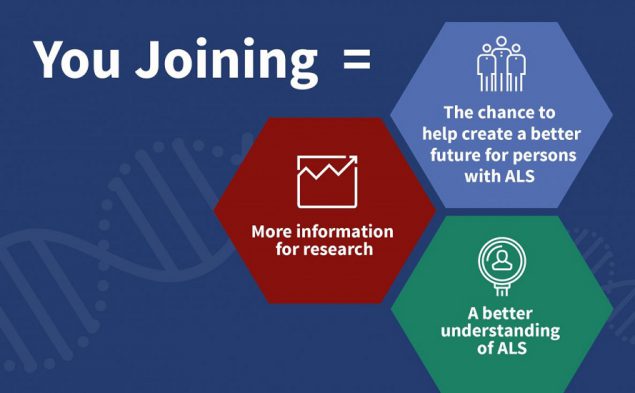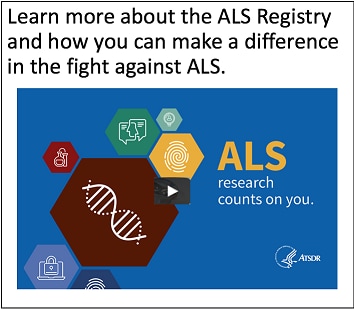Join the National ALS Registry
About the Registry
The National Amyotrophic Lateral Sclerosis (ALS) Registry allows persons with ALS to fight back and help defeat ALS (Lou Gehrig’s Disease). By signing up, being counted, and answering brief questions about you and your disease, you can help researchers find answers to important questions.
The National ALS Registry is a program to collect and analyze data about persons living with ALS.
- It includes data from existing national databases and information provided by persons with ALS who choose to take part.
- Researchers can use Registry data to look for disease pattern changes over time. They can also try to identify whether there are common risk factors among individuals with ALS.
By joining the Registry and taking the risk factor surveys, individuals living with ALS will help provide a better picture of who gets ALS and risk factors for the disease.
What are the Goals of the Registry?
The main purpose is to gather information that can be used in the fight against ALS.
The information is used to
- estimate the number of new cases of ALS diagnosed each year,
- estimate the number of people who have ALS at any given point in time,
- better understand who gets ALS and what factors affect the disease, and
- enhance research that could improve care for people with ALS.
Why Should I Join the Registry?
It is important to include as many people living with the disease as possible to get the most accurate information.
When you join, you help give researchers more information. This could lead to a better understanding of the risk factors for ALS, and could help offer a better future for persons with ALS.

Resources Available through the Registry
The Registry has many parts that allow persons living with ALS to help advance research. This includes:
- Choosing to receive emails about clinical trials and epidemiological studies, and
- Donating blood, saliva, and urine to the National ALS Biorepository
- A biorepository is a facility that collects and stores samples of biological material. This could include blood, urine, tissue, cells, DNA, and proteins. Some medical information may also be stored along with a written consent form.
Additional resources available through the Registry include
- ALS clinics and support group information,
- Fact sheets about ALS and the Registry , and
- Reports and journal articles.
Learn More about Signing Up
Any U.S. citizen or legal resident with ALS who is at least 18 years of age can sign up for the Registry. All that you need is a computer, an internet connection, and an email address. If you need help, caregivers or others can assist in person or over the phone.
All Registry information is private. It can only be viewed by Registry approved scientists. Anyone who registers is not identified by name.
What kind of information is collected?
The National ALS Registry collects basic information such as your age and sex. The surveys collect data on occupational and environmental risk factors, such as military history, work history, physical activity, and family history.
For frequently asked questions about survey contents, click here.
